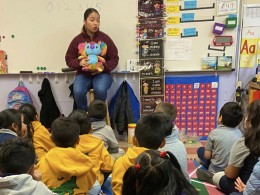Introduction
Learning a new language can open doors to new cultures, career opportunities, and personal growth. But let’s face it mastering a language can feel overwhelming, especially if you’re short on time. The good news is that with the right strategies, you can learn a new language quickly and effectively. Whether you’re preparing for a trip, expanding your professional skills, or simply challenging yourself, this guide will provide you with practical tips to accelerate your language-learning journey. From immersive techniques to smart study habits, we’ll cover everything you need to know to start speaking a new language with confidence. Let’s get started!
Rise of New Language Learning

Learning new languages has become more popular than ever before. With the world becoming more connected through travel, work, and technology, people are eager to speak more than one language. Thanks to apps and online tools, it’s easier to learn languages than ever before. More people are seeing the value of being bilingual, whether for travel, career, or personal growth.
Benefits of Learning a New Language
Learning a new language offers many benefits. It can improve your job prospects, make traveling easier, and help you connect with people from different cultures. It also boosts brain function, improves memory, and even makes you more creative. Plus, knowing a second language can help you understand different perspectives and open up opportunities in your personal and professional life.
Role of Language Learning in Today’s World
In today’s world, speaking more than one language is incredibly useful. It plays a big role in global business, education, and communication. Many companies prefer employees who can speak different languages. It also helps students perform better in school, as learning a new language improves cognitive skills. Overall, language learning has become an essential skill in a globalized society.
Tips to Learn a New Language Quickly

1. Set Clear Goals
Tip: Define your language-learning goals, whether it’s conversational fluency, reading comprehension, or professional proficiency.
Example: If you’re learning Spanish for travel, focus on common phrases and vocabulary for dining and transportation.
2. Immerse Yourself
Tip: Surround yourself with the language through movies, music, podcasts, and conversations with native speakers.
Example: Watch French films with subtitles or listen to German podcasts during your commute.
3. Use Language Learning Apps
Tip: Leverage apps like Duolingo, Babbel, or Rosetta Stone for structured lessons and practice.
Example: Spend 15 minutes daily on Duolingo to build vocabulary and grammar skills.
4. Practice Speaking Daily
Tip: Speak the language as often as possible, even if you make mistakes. Practice with language partners or tutors.
Example: Use platforms like iTalki or Tandem to connect with native speakers for conversation practice.
5. Focus on High-Frequency Words
Tip: Learn the most commonly used words and phrases first to build a functional vocabulary quickly.
Example: In Italian, master greetings, numbers, and essential verbs like “to be” and “to have.”
6. Create a Study Routine
Tip: Dedicate consistent time each day to language learning, even if it’s just 20-30 minutes.
Example: Study Japanese vocabulary during breakfast and review grammar before bed.
Importance of Consistency in Learning

When learning a language, it’s important to practice regularly. Even if it’s just for a few minutes each day, consistent practice helps you remember what you’ve learned. It’s better to practice a little bit every day than to study for long hours once in a while. The more you use the language, the easier it becomes to speak and understand.
Immersing Yourself in the Language
Immersion is one of the fastest ways to learn a language. This means surrounding yourself with the language by watching movies, listening to music, or speaking with others. The more you hear and see the language, the more natural it will feel. If possible, visiting a country where the language is spoken can speed up the learning process.
The Role of Technology in Learning
Technology has made learning a language easier and more accessible. Language learning apps like Duolingo, Babbel, and Memrise allow you to study at your own pace. You can also find online tutors or join language exchange programs to practice with native speakers. Technology helps you learn anytime and anywhere, making language learning more flexible.
Motivation and Setting Goals

Staying motivated is one of the biggest challenges in language learning. Setting small, achievable goals can keep you focused and give you something to celebrate. For example, learning 10 new words each week or being able to hold a basic conversation by the end of the month. Tracking your progress and rewarding yourself for hitting goals helps keep motivation high.
Overcoming Language Barriers
One of the toughest parts of learning a language is overcoming the fear of making mistakes. Many people hesitate to speak because they worry about saying something wrong. However, making mistakes is a natural part of learning. The more you practice and use the language, the more confident you will become, and eventually, you’ll make fewer mistakes.
The Social Aspect of Language Learning
Learning a language is not only about memorizing words and grammar rules; it’s also about connecting with others. Speaking a new language opens up opportunities to make new friends, understand different cultures, and even explore new career options. Joining language groups or finding conversation partners helps you stay motivated and makes learning more enjoyable.
Learning Through Practice

The best way to learn a new language is by using it often. Even if you’re still learning, don’t be afraid to try speaking it every day. Practice is the key to improving. Start by saying simple things, like greeting people or ordering food. Over time, you’ll get better and feel more comfortable using the language.
Watching and Listening to Native Speakers
One helpful way to learn a language is by listening to how native speakers talk. Watching TV shows, movies, or YouTube videos in the language helps you learn new words and understand how sentences are formed. You can also listen to songs or podcasts. This helps you get used to the rhythm and sound of the language.
Reading Books and Articles
Reading books or articles in the language you’re learning is another great way to improve. Start with something simple, like children’s books or short stories. Reading helps you see how words are used in context, and it improves your vocabulary. As you get better, you can try reading more difficult material, like news articles or novels.
Using Flashcards to Remember Words
Flashcards are a simple yet powerful tool for learning new words. You can write the word on one side and the meaning on the other. You can use physical cards or apps like Anki or Quizlet. Flashcards help you remember words by repeating them regularly. The more you practice, the better you’ll remember them.
Finding a Language Buddy

Having someone to practice with makes learning easier and more fun. A language buddy is a friend or partner who also wants to learn or is already fluent in the language. You can practice speaking with them, ask questions, and help each other out. This way, you’re not learning alone, and you can learn faster together.
Being Patient with Yourself
Learning a new language takes time, and it’s important to be patient with yourself. It’s normal to feel frustrated at times, especially when things don’t seem to click. But don’t give up! Every mistake is a step forward, and the more you practice, the better you’ll get. Stay positive and celebrate your progress, no matter how small.
Challenges of Learning a New Language
Learning a new language can be tough. One of the biggest challenges is overcoming the fear of making mistakes. Many people also struggle with remembering vocabulary or understanding grammar rules. Consistency and motivation are key, but it can be hard to stay on track. It’s normal to face obstacles, but with practice, anyone can overcome them.
Future of Language Learning
The future of language learning is bright. Technology will continue to make it easier for people to learn languages quickly and effectively. Apps, virtual reality, and online courses are constantly improving. As globalization grows, knowing more than one language will become even more important. The future will offer even more exciting ways to learn and connect with others across the world.
Analysis Table: Effective Language Learning Methods
| Method | Description | Effectiveness | Best For |
|---|---|---|---|
| Flashcards | Review vocabulary regularly | High | Vocabulary building |
| Immersion | Surround yourself with the language | Very High | Listening and speaking |
| Consistent Practice | Practice regularly, even if for a short time | Very High | Long-term improvement |
| Fun Activities | Use games, videos, and cultural exploration | High | Motivation and enjoyment |
| Language Communities | Join groups for support and practice | Moderate to High | Motivation and practice |
Comparative Table: Popular Language Learning Methods
| Method | Learning Speed | Cost | Flexibility | Social Interaction |
|---|---|---|---|---|
| Language Apps | Moderate | Low | High | Low |
| Immersion (Living Abroad) | Very Fast | High | Low | High |
| Online Language Classes | Moderate | Moderate | Moderate | High |
| Language Exchange (Apps) | Fast | Low | High | Very High |
Conclusion
Learning a new language doesn’t have to be a daunting task. By setting clear goals, immersing yourself in the language, and practicing consistently, you can make significant progress in a short amount of time. Remember, the key to success is persistence and a willingness to step out of your comfort zone. Whether you’re learning for travel, work, or personal enrichment, these tips will help you achieve your language-learning goals. So, pick a language, embrace the journey, and start speaking today!
Call to Action
What language are you learning or planning to learn? Share your goals and progress in the comments below, and don’t forget to subscribe for more tips on language learning and personal growth!









